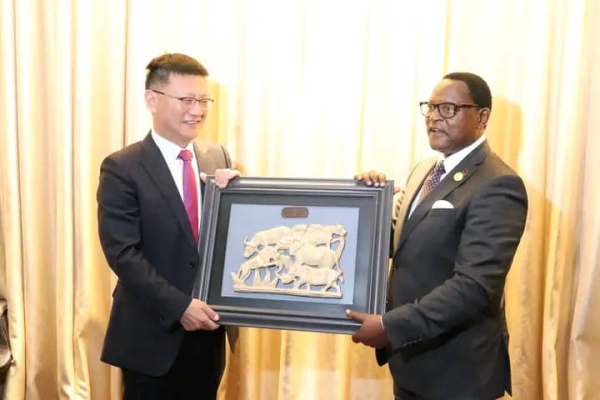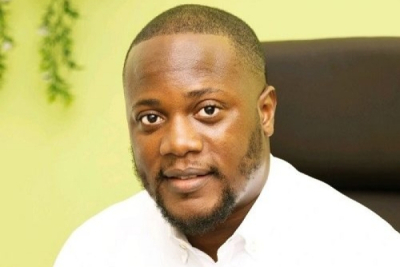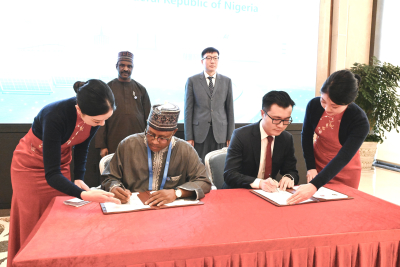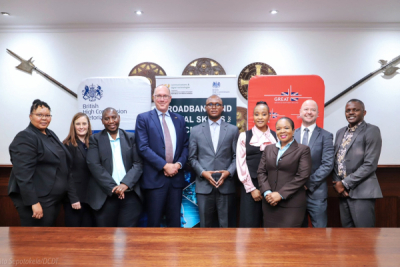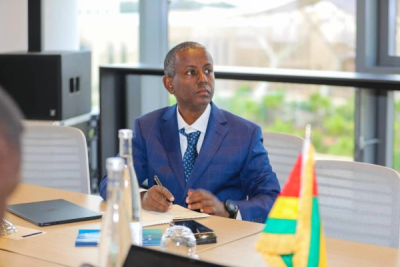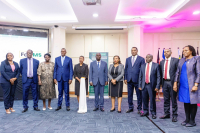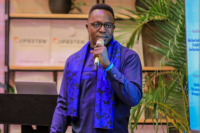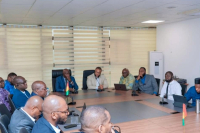Enhanced digital access in rural areas fosters economic opportunities by connecting communities to markets, information, and services that were previously out of reach. This can lead to improved agricultural practices through smart farming technologies, better education and healthcare services, and greater access to financial services.
The Government of Malawi has announced plans to launch a "Smart Village Initiative" in partnership with Huawei Technologies. This initiative aims to bring digital transformation to rural areas across the country.
President Lazarus Chakwera revealed the plan on September 3, on the sidelines of the Summit of the Forum on China-Africa Cooperation (FOCAC) being held from September 4-6 in Beijing. He emphasized that the initiative would include establishing technical training centers in rural areas to equip youth with essential digital skills, such as AI, cybersecurity, and smart agriculture solutions, which are vital for supporting large-scale farming initiatives.
The Smart Village Blueprint, conceived as a practical tool to improve Internet access in rural and remote areas, will be the foundation of this project. The Smart Villages project adopts a locally led, integrated approach to providing digital services to all rural citizens. By integrating digital technologies, the initiative aims to deliver equitable, high-quality, and efficient services related to the Sustainable Development Goals (SDGs) for all.
Huawei has been instrumental in transforming rural and urban areas across Africa through its smart village and city initiatives. In July, the company partnered with Zambia to launch a smart village in Namwala, enhancing connectivity and digital access in rural communities. Huawei also recently signed an agreement with Kaduna State, Nigeria, to develop a smart city project, integrating advanced technologies like AI and IoT to improve public safety and transportation.
This initiative aligns with the Malawi 2063 (MW2063) agenda, which envisions transforming Malawi into an industrialized upper-middle-income country by 2063. It builds on a series of successful collaborations between Malawi and Huawei, including the 2022 launch of the country’s first-ever National Data Center, a key milestone in advancing Malawi's digital infrastructure.
Hikmatu Bilali
As a serial entrepreneur, he specializes in providing technology solutions for the commerce sector. He developed a platform that empowers merchants and restaurants to deliver their products throughout the Democratic Republic of Congo.
Eric Bemba (photo) is a Congolese serial entrepreneur and the founder of Wiikko, an online platform for buying and selling goods.
Founded in 2019, Wiikko connects consumers with their favorite restaurants and stores. The startup aims to become a trusted partner for fast and reliable deliveries while offering customers an optimal experience. Its mobile app features a wide range of businesses, allowing users to discover new products and take advantage of promotional offers. Wiikko also collaborates with numerous delivery drivers to facilitate deliveries for its partners.
In addition to his work with Wiikko, Eric Bemba is the General Manager of Yango Congo, a mobility company operating in both the Democratic Republic of Congo (DRC) and the Republic of Congo. He is also the co-founder of Splitti, a fintech platform launched in 2020 that allows users to create groups and easily collect funds for various events such as birthdays, weddings, farewell parties, or projects.
Eric Bemba graduated from the University of Alabama in the United States, where he earned a bachelor's degree in commerce and business administration in 2009. He worked as a senior consultant for the tax and legal firm EY from 2013 to 2016. He then joined the financial network Compagnie Financière du Congo (CFC) as an independent consultant. In 2017, he was appointed Development Manager at SESOMO Services, a human resources service provider in the DRC. From 2019 to 2020, he served as CEO of Rawgeneration, a startup accelerator in the DRC.
Melchior Koba
With a strong foundation in accounting, he discovered his interest in technology and pursued formal training in computer science. He leveraged his combined expertise to revolutionize healthcare, creating a cutting-edge telemedicine platform.
Cameroonian tech entrepreneur Jean Lobe Lobe (photo) is the founder and CEO of Waspito, a telehealth platform launched in 2020. Through that platform, he connects Africans with doctors and laboratories.
Patients can access instant video consultations with specialists via their smartphones. Additionally, the platform provides a database of pharmacies and medical laboratories, streamlining the purchase of medications and scheduling of blood tests following an online consultation. Medications can be delivered directly to patients' homes. Waspito also features a health discussion forum, moderated by doctors, where users can ask questions anonymously and receive real-time answers.
In 2020, Waspito won the Orange Ventures MEA Seed Challenge and was named Best HealthTech Startup in Africa at the Africatech Awards, part of Viva Technology 2023.
The idea for Waspito came to Lobe after his father passed away from a heart attack in a town without a cardiologist. "I lost my father a few years ago when he had a heart attack in a town without a cardiologist. He died while being transported to the nearest city with a cardiologist," the startup founder recalled in August 2024.
Lobe also serves on the board of directors for Unity Co-operative Society (UNICS), a microfinance institution in Cameroon. Before founding Waspito, he established Heptic Holdings in 2016, where he served as CEO until 2020. This company supports the creation and development of startups.
A self-taught computer enthusiast, Lobe holds an accounting degree from Oxford Brookes University in England. His professional career began in 2010 at Union Bank of Cameroon, where he was responsible for banking operations. In 2011, he worked as a financial auditor for Audit and Accounting Corporation (AUDICO) in Cameroon.
In 2012, he joined the airline CAMAIR-CO as a general accountant. Later, he was hired by British American Tobacco where he worked from 2012 to 2016. During his tenure, he held HR management positions in Nigeria, West Africa.
Melchior Koba
Africa's cities are facing rapid population growth. Providing millions of people with an adequate living environment requires more targeted investment. The integration of ICTs into urban policies should no longer be overlooked.
Kaduna State Governor Uba Sani and Chris Lu, the CEO of Huawei Technologies Nigeria Limited, have signed a Memorandum of Understanding (MoU) for the Kaduna State Smart City Project. The ceremony which took place at Huawei’s office in Beijing, yesterday September 2, was attended by Nigeria’s President, H.E. Bola Ahmed Tinubu.
Governor Uba Sani explains that“ this project holds the key to a more secure and prosperous Kaduna State.” It will focus on several key areas, including the establishment of a State-Level Unified Command Center, which will centralize and improve security operations. It will also introduce advanced Intelligent Traffic Management systems to optimize transportation within the state. E-Government and Office Automation will streamline administrative processes, while Smart Education and Healthcare initiatives aim to elevate public services.
Additionally, the project will promote ICT Talent Development and integrate Renewable Energy solutions to support sustainable development. Public Transportation will also be enhanced through advanced technology. To ensure the project's success, Kaduna State and Huawei will establish a joint committee to finalize the implementation plan, funding arrangement, and technology deployment.
The UN Department of Economic and Social Affairs (DESA) reports that Nigeria is experiencing rapid urbanization, with more than half of its 213 million population now residing in urban areas. Currently, 53% of Nigerians live in cities, and this figure is expected to exceed 70% by 2050, presenting various challenges. Smart cities could provide effective solutions for managing this urban growth by optimizing resources and services.
Hikmatu Bilali
South African lawmakers have completed digital economy courses to gain a better understanding of technology. Now, local officials are set to receive similar training.
South Africa's Minister of Communications and Digital Technologies Solly Malatsi on Tuesday launched the Broadband and Digital Skills Program, aimed at equipping municipal leaders and councilors with skills to leverage digital innovations, improve service delivery and enhance public engagement.
According to Malatsi, public representatives, particularly councilors, are often overwhelmed by numerous service requests and critical decisions they must make daily. Acquiring digital skills enables them to work more efficiently and respond more swiftly to public inquiries, making them more accessible to citizens.
The initiative, implemented in partnership with the British Embassy and the South African Local Government Association (SALGA), comes amid the rapid acceleration of digital transformation. It is part of the South African government's national strategy on digital and future skills. According to the strategy, acquiring digital skills is expected to create new jobs, significantly improve quality of life, education, and drive economic growth.
"In recognition of the fact that trends and advances in information and communications technology are ever evolving, we are committed to developing these competencies to realise our mission to digitally skill, upskill, and reskill the population," Malatsi said.
Adoni Conrad Quenum
Artificial intelligence offers Africa a chance to tackle key challenges and drive economic growth. But to fully capitalize on AI, significant investments are needed.
Djibouti plans to become a regional hub for artificial intelligence (AI) innovation, according to Houssein Ahmed Assoweh (photo), the country's representative at the ICESCO regional workshop for the development of the Islamic World Charter on AI.
In an interview with the Djiboutian News Agency ADI, Houssein Ahmed Assoweh said: "We will continue to invest in AI education and training to strengthen national skills. Additionally, we plan to launch several pilot projects in identified priority areas. The goal is to position Djibouti as an AI innovation hub in the Horn of Africa. I am convinced that Djibouti has an important role to play in the global AI ecosystem.”
According to the AI expert, Djibouti is developing its national AI strategy, focusing on improving living conditions in a challenging environmental context. The strategy includes the application of AI in critical areas such as smart agriculture, healthcare, logistics and transportation, as well as education. These efforts are part of "Vision 2035," the Djiboutian government's development strategy aimed at equipping the country with world-class digital infrastructure.
By investing in AI, Djibouti aims to become a key player in technological innovation in Africa. AI could notably enable significant advances in smart agriculture, optimizing crop yields despite the country's climate challenges. In healthcare, AI could facilitate more accurate diagnoses and increased access to care, particularly in remote areas.
According to PwC's "Annual Global CEO Survey," AI could contribute up to $15.7 trillion to the global economy by 2030, with $1.2 trillion potentially generated in Africa. This contribution could represent a 5.6% increase in the continent's GDP over that period, highlighting the enormous potential of AI to boost Africa's economic growth if properly harnessed.
Samira Njoya
In many African nations governance is riddled with a lack of transparency, which is critical for building public trust and ensuring that development initiatives are implemented effectively. The introduction of digital platforms streamlines public administration to increase transparency in government activities, addressing public concerns about unfulfilled promises and resource management.
The Kenyan government launched, yesterday September 2, two innovative digital platforms, aimed at enhancing transparency and efficiency in public administration. The platforms, the Presidential Directives Management Information System (PDMIS) and the Foreign Travel Management Information System (FOTIMS), were officially introduced at the Kenyatta International Convention Centre by Deputy President Rigathi Gachagua and Dr. Margaret Ndung’u, the newly appointed Cabinet Secretary for Information, Communications, and the Digital Economy (MICDE).
“The Presidential Directives Management Information System (PDMIS) and Foreign Travel Information Management System (FOTIMS) are a huge milestone in our quest to deal with obscurity in decisions undertaken as raised by Kenyans recently,” said Rigathi Gachagua in a tweet shared the same day.
This system tracks and manages directives from President William Ruto, ensuring efficient and transparent implementation. It is accessible only to high-level officials, centralizing all directives and eliminating the need for paper copies.
FOTIMS digitizes the approval process for foreign travel by senior officials, ensuring justifications are made and resources are used wisely. Access is limited to authorized personnel, enhancing oversight.
The launch of PDMIS and FOTIMS represents a key step in Kenya's digital transformation, aiming to set higher standards for accountability and efficiency in public administration.
This move aligns with the Kenyan government’s efforts to improve digital governance. In the 2022 UN E-Government Index ranking, which assesses the digital government landscape of UN member countries, the country rose from 116th to 113th out of 193 countries, reflecting its ongoing commitment to enhancing its digital government capabilities. Introducing these new digital platforms further underscores Kenya's progress in public administration, as they are likely to contribute to continued improvements in transparency, efficiency, and overall governance.
Hikmatu Bilali
A financial expert with a focus on economic policy, he aims to expand financial access in Africa. His vision is for Service Cops to become a leader in technological innovation across Sub-Saharan Africa and Asia.
Ugandan entrepreneur Joseph Kiiza (photo) is the co-founder and executive chairman of Service Cops, a fintech startup focused on business process outsourcing (BPO).
Founded in 2012, Service Cops aims to optimize business processes, increase revenue, and reduce costs for its clients. The company seeks to become a global leader in fintech and BPO. It developed several fintech solutions, including SchoolPay, a universal digital platform that simplifies school fee payments and school management. This solution allows parents and guardians to easily pay fees, while school administrators can efficiently manage their tasks. Another solution is Vantage, a credit account management platform.
The company also designed other technological solutions, such as School Suite software, which facilitates the management of educational institutions. This software enables teachers, administrators, and students to digitize daily educational processes.
In 2023, Service Cops formed a strategic partnership with Awash Bank, a private Ethiopian bank, in the framework of its expansion. Under that partnership, it initially offers digital loans to Awash Bank’s clients before gradually extending the service to non-bank users.
“Our long-term growth plan is to have a significant presence in all emerging economies in Africa and Asia, targeting key economic blocs such as the East African Community (EAC), the Southern African Development Community (SADC), the Economic Community of West African States (ECOWAS), and the Association of Southeast Asian Nations (ASEAN),” Kiiza stated.
In addition to his role at Service Cops, Joseph Kiiza is the CEO of Edge Micro Insurance, an insurance company in Uganda. He also serves on the board of Nepserv Consults, a Ugandan financial institution.
The entrepreneur holds two master's degrees from Makerere University in Uganda, one in finance and another in economic policy and planning, both obtained in May 2024.
Melchior Koba
He wants to revolutionize global health, entrepreneurship, and leadership. His career in healthcare has garnered numerous prestigious awards.
Kenyan entrepreneur Stephen Ogweno is the co-founder and CEO of Lifesten Health, a digital health startup based in Rwanda. Lifesten Health enables users to set specific health goals, track their vital signs, and receive rewards for their progress.
Founded by Ogweno and Peace Ndoli, Lifesten Health focuses on medical technologies and aims to educate and raise awareness about lifestyle-related diseases while promoting healthier living habits through technological advancements. Their digital health platform offers web and mobile solutions to help users better manage their nutrition, well-being, health, and mindfulness. By leveraging artificial intelligence and behavioral learning, the platform helps users understand their health status and receive expert advice to improve it, with a special emphasis on mental well-being.
Ogweno is also the founder and CEO of the Stowelink Foundation, an organization established in 2015 that develops innovative community health projects focused on people, prioritizing non-communicable diseases, health technologies, research, and advocacy. Additionally, he serves as the director of the World Obesity Foundation, an organization dedicated to combating obesity, and is a member of the Board of Governors for NCD Child, a multi-stakeholder coalition advocating for the rights and needs of children, adolescents, and young people affected by non-communicable diseases.
Ogweno holds a bachelor's degree in population health from Kenyatta University in Kenya, obtained in 2019, and a master's degree in public health from the University of Manchester in England, earned in 2023. His commitment to digital health innovation and public health has been recognized multiple times. In 2020, he was named one of Africa's 100 most influential young leaders, and in 2021, he was honored as one of Kenya's Youth of the Year as part of the Top 35 Under 35 National Awards. In 2022, he was awarded the Kenyan Quality Health Care Award for Health Innovation of the Year.
Melchior Koba
African nations are increasingly forming partnerships to accelerate their digital progress. New initiatives are emerging rapidly, building momentum towards a digitally transformed continent.
A Sierra Leonean delegation visited Guinea last week to discuss the implementation of a fiber optic interconnection project between the two countries. The project aims to enhance internet connectivity and resilience in both nations.
According to Mohamed Kourouma, general manager of Guinea's National Backbone Management and Operations Company, the project is crucial as Guinea currently relies on a single submarine cable for international internet connectivity.
The working visit follows discussions initiated in early August between Guinea's Minister of Posts, Telecommunications, and Digital Economy, Rose Pola Pricemou, and her Sierra Leonean counterpart, Salima Manorma Bah. During the talks, they announced an ambitious project aimed at ensuring a permanent and reliable Internet supply in both countries.
The discussions among the various parties laid the groundwork for the signing of a framework agreement, which is expected to be signed after review by the competent authorities of both nations. This agreement will define the technical modalities for implementing this strategic partnership.
The partnership is seen as a way to significantly improve the quality and scope of connectivity services while reducing associated costs. Moreover, strengthening Internet access and sharing expertise will help accelerate the achievement of the two countries' shared ambitions for digital transformation, while also promoting digital inclusion for their respective populations.
Samira Njoya
More...
Designed to expand credit access for African immigrants, it enables money transfers to approximately 20 African countries.
Kredete is a fintech solution developed by a Nigerian startup designed specifically for African immigrants in North America. The platform enables users to send money to over 20 African countries and establish a credit score.
Built on blockchain technology, Kredete ensures that all financial transactions are secure and efficient. For money transfers, the platform uses stablecoins, significantly reducing transfer fees. Launched in 2023 by Adeola Adedewe, Kredete secured $2.25 million in funding last August to enhance its technology and expand into new African markets.
According to Adedewe, "Kredete is more than just a remittance service; it’s a gateway to financial inclusion for African immigrants in the diaspora.”
“[...] Our goal is to empower our users to build a secure financial future, no matter where they are migrating into," he added.
Kredete is available as a mobile app on iOS and Android, with over 100,000 downloads on the Play Store. After downloading, users can create an account and access the platform. Users can then fund their multi-currency digital wallet to make various financial transactions.
On the mobile platform, users can transfer funds between digital wallets, send money to mobile money accounts in supported African countries, or make bank transfers. Each transaction contributes to building the user's credit score. Kredete updates user data with every transaction. Additionally, the startup offers a referral program that rewards users with up to $20 for each person they refer.
Adoni Conrad Quenum
Cocoa is a vital export for many African nations, yet production challenges limit the sector's potential. Leveraging technology can address these issues, leading to improved market access and higher prices for African cocoa.
Cameroon's cocoa sector has unveiled plans to launch a digital platform that will provide georeferencing data for cocoa plantations across the country. The Cocoa and Coffee Interprofessional Council (CICC) formalized this initiative with an agreement signed on August 28. Supported by key industry players such as Atlantic Cocoa Corporation, Neo Industries, Ofi Cam, Sic Cacaos, Telcar Cocoa, and the Cocoa and Coffee Subsectors Development Fund, the platform aims to ensure that all cocoa beans produced in Cameroon can be accurately traced to their origin.
CICC Executive President Apollinaire Ngwe emphasized the significance of this initiative, stating, “This marks a significant step forward in technological integration and inter-professional collaboration. The system will provide operators with immediate access to precise and up-to-date data, facilitating more efficient supply chain management.”
Georeferencing involves assigning precise geographical coordinates to cocoa plantations, enabling each location to be uniquely identified. This data-sharing system will centralize important information such as farmers’ locations, farm details, productivity, and sales, allowing cocoa exporters to quickly access coordinates for producers' farms.
This initiative is driven by the need to meet EU legislation set to take effect by the end of the year, which will prohibit the entry of goods produced on deforested or degraded land into the European market. The platform will be instrumental in maintaining Cameroon’s access to this crucial market where in 2020 the country exported 65% of the cocoa it produced, according to data from the EU sustainable cocoa program.
Cameroon is one of Africa’s top cocoa producers globally. WorldAtlas ranks the country as one of the top six cocoa-producing countries producing over 290,000 tons annually. The new platform will guarantee the international standard quality of its production.
Hikmatu Bilali
Malaria remains one of Africa’s most pressing public health issues, accounting for over 90% of global malaria cases and deaths. Leveraging AI to enhance prevention, detection, and treatment can drastically reduce the disease’s burden, saving lives and improving health outcomes.
The University of Zambia (UNZA) and the Convergence Research Centre for Insect Vectors (CRCIV) of South Korea have signed an agreement to advance malaria research using artificial intelligence (AI). The partnership, signed on August 30, will establish a Research Center of Excellence at UNZA’s School of Engineering, focusing on preventing malaria outbreaks through AI technology.
For UNZA Acting Vice Chancellor, Professor Bornface Namangala, the partnership marks the beginning of a transformative effort to tackle malaria, a leading cause of death in Zambia.
SMART Zambia National Coordinator, Percy Chinyama, praised the collaboration, noting that the center could serve as a learning platform and help institutionalize AI in Zambia.
The initiative will leverage cutting-edge AI technology to identify mosquito species and combat malaria. An AI-powered system will be deployed to collect and accurately classify mosquito species, enhancing the precision of malaria prevention efforts. This project has garnered strong support from the government.
According to the U.S. President’s Malaria Initiative (PMI), which aids sub-Saharan African countries in controlling and eliminating malaria, Zambia remains highly endemic, with the entire population at risk. In 2022, the National Malaria Elimination Centre (NMEC) reported over 8.4 million cases, an incidence rate of 428 per 1,000 people annually, and 1,337 malaria-related deaths, equating to 8 deaths per 100,000 people.
This initiative aligns with Zambia’s National Malaria Monitoring and Evaluation (M&E) Plan 2022-2026, which outlines a framework for tracking malaria program indicators, data sources, analysis, information flow, reporting, and feedback for informed decision-making. It directly supports the plan’s goal of improving data-driven decision-making and achieving better health outcomes.
Hikmatu Bilali
The Bank of Uganda has granted Tanzanian fintech NALA an International Money Transfer Operator (IMTO) license, the fintech announced on August 29. This allows NALA to expand its operations in Uganda by integrating directly with mobile money services, offering users a seamless way to transfer funds into local mobile wallets and enhancing the efficiency and security of cross-border payments.
NALA facilitates money transfers from the UK, US, and EU to several African countries, including Uganda. It has collaborated closely with the Bank of Uganda to meet regulatory requirements, contributing to an increase in foreign exchange supply, which is vital for economic growth.


